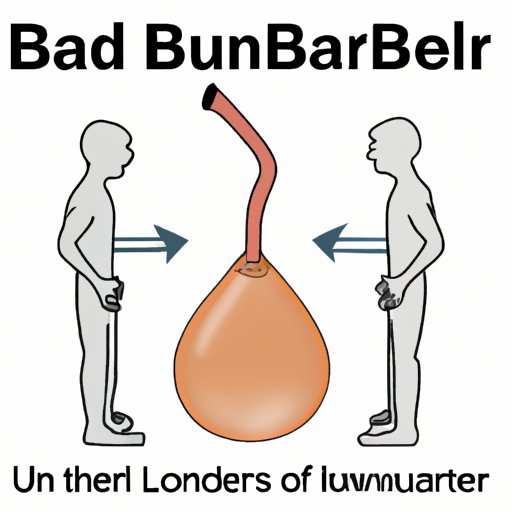Introduction
The bladder is a large organ in the lower abdomen that stores urine until it is ready to be eliminated from the body. It is made up of several layers of muscles, nerves and connective tissue that work together to control the release of urine. The anatomy and physiology of the bladder are complex and essential for proper functioning of the urinary system.
This article is intended to provide an overview of how the bladder works, common bladder-related disorders, and treatments available. We will also explore ways to support bladder health through diet and lifestyle changes. Understanding the bladder and its role in the body can help to improve overall health and wellbeing.
How Does Urine Flow Through the Bladder?
When the bladder fills with urine, signals are sent to the brain that it is time to urinate. The muscles surrounding the bladder then relax, allowing urine to pass into the urethra, the tube leading from the bladder to the outside of the body. This process is regulated by the autonomic nervous system, which controls involuntary bodily functions such as breathing and digestion.
In some cases, however, the muscles surrounding the bladder may not relax properly, resulting in difficulty with urination. This can be caused by a variety of factors including muscle tension, nerve damage, or a structural abnormality in the bladder. In addition, certain medications, such as antihistamines and antidepressants, can interfere with bladder muscle relaxation.

Common Disorders Related to the Bladder
There are many different types of bladder-related disorders, ranging from mild to severe. Some of the most common include urinary tract infections (UTIs), overactive bladder syndrome (OAB), interstitial cystitis (IC) and bladder cancer. Each of these conditions has its own set of symptoms and treatment options.
Symptoms of bladder issues can include frequent and/or painful urination, difficulty starting or stopping the flow of urine, urgency to urinate, and leakage of urine. Depending on the underlying cause of the condition, other symptoms may also be present. It is important to speak with a healthcare provider if any of these symptoms are experienced.

Diet and Lifestyle Influence on Bladder Health
Certain dietary and lifestyle factors can have an impact on bladder health. Eating a balanced diet that includes plenty of fruits, vegetables, whole grains, and lean proteins can help to keep the bladder healthy. Limiting the intake of caffeine and alcohol can also help to reduce the risk of bladder problems. Staying hydrated by drinking plenty of water throughout the day is also beneficial.
In addition to diet, exercise and stress management are important for maintaining bladder health. Regular physical activity helps to strengthen the muscles surrounding the bladder, while reducing stress can help to prevent bladder spasms. Practicing mindfulness and relaxation techniques can also be beneficial.
Overview of Treatments for Bladder Issues
Treatment for bladder-related conditions depends on the underlying cause. Medications such as antispasmodics and anticholinergics are often used to help relax the bladder muscles and reduce the urge to urinate. Surgery may also be recommended in some cases. Other treatment options may include pelvic floor exercises, electrical stimulation, and biofeedback.

Understanding the Role of Medications in Managing Bladder Conditions
Medications used to treat bladder-related disorders can have various side effects, including dry mouth, constipation, dizziness, and blurred vision. It is important to discuss any potential side effects with a healthcare provider before taking any medication. Additionally, some medications may interact with other drugs, so it is important to provide a complete list of all medications being taken.
Conclusion
The bladder is an essential part of the human body, responsible for storing and eliminating urine. Understanding how the bladder works, common bladder-related disorders, and treatments available can help to improve overall health and wellbeing. Diet and lifestyle changes can also play a role in maintaining bladder health. If you have any concerns about your bladder health, speak with your healthcare provider for further advice.
For more information about bladder health and treatments, visit the National Institute of Diabetes and Digestive and Kidney Diseases website at https://www.niddk.nih.gov/.
(Note: Is this article not meeting your expectations? Do you have knowledge or insights to share? Unlock new opportunities and expand your reach by joining our authors team. Click Registration to join us and share your expertise with our readers.)
